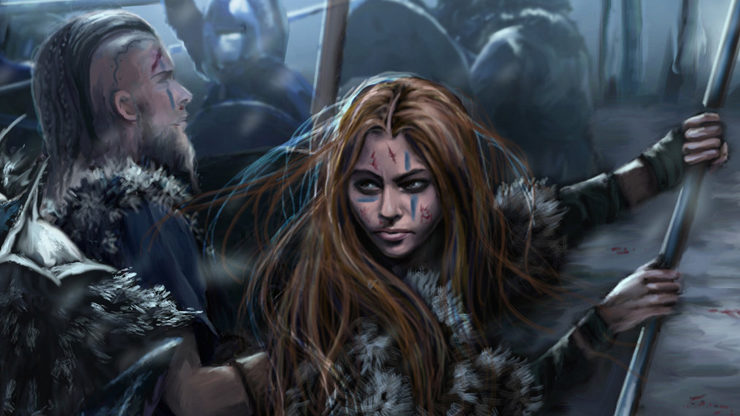In Which Finrod Makes First Contact With the Secondborn, Men Start Picking Teams, and A Woman Shows How It’s Done
It’s time for another hit of the Rewind button as we reach Chapter 17, “Of the Coming of Men Into the West.” Gondolin is well into its two hundred years of peace, yet before Aredhel the White Lady of the Noldor goes out and begets a son, the race of Men finally makes their way to this corner of Middle-earth. You know, the corner where the Eldar keep all their stuff, the Dwarves mind their own business, and the Dark Enemy of the World broods in confinement.
This chapter is sort of the Mannish counterpart to Chapter 5, “Of Eldamar and the Princes of the Eldalië,” in that Tolkien lobs another volley of names at us. It’s not always easy to keep them straight, given their lovely if bewildering alliterative and assonantic nomenclatures. But some of them may be familiar to you already, such as Beren “One-Hand,” who may or may not someday need to shop at the Leftorium.
Dramatis personæ of note:
- Finrod – Noldo, King of Nargothrond, friendly neighborhood Felagund
- Beör – Man, chieftain of the house of himself
- Thingol – Sinda, prickly King of Doriath
- Amlach – Man, indignant malcontent of the House of Hador
- Amlach – Wait, what?
- Haleth – (Wo)man, chief of the Haladin
Of the Coming of Men Into the West
When Frodo offers to take the One Ring in “The Council of Elrond,” the Half-elven loremaster places the hobbit in high esteem when he says:
But if you take it freely, I will say that your choice is right; and though all the mighty Elf-friends of old, Hador, and Húrin, and Túrin, and Beren himself were assembled together, your seat should be among them.
So who are these First Age fellows and why would Elrond, who isn’t even born yet at this point in The Silmarillion, hold them aloft as he does? Well, we’ll learn each of their stories soon enough, but we need to start with where they came from….
Three hundred years have now elapsed since the Noldor returned to Middle-earth. Its princes have long since settled into their realms and strongholds and become kings; the greatest of these kingdoms are Doriath, Gondolin, and Nargothrond. And Morgoth is still hemmed in by the vigilant forces of High King Fingolfin and Maedhros, eldest son of Fëanor. But now let’s talk about Finrod Felagund, Hewer of Caves and Lord of Nargothrond, who lives further south than all of them…when he’s actually home.
We already know that Finrod is a bit of a loose cannon. He’s the eldest of the house of Finarfin and the ruler of most of the Elves in West Beleriand, but he often goes abroad and makes new friends in a way that other kings never do. Turgon in Gondolin definitely isn’t coming out of hiding for a while, and Thingol in Doriath never walks beyond the nice fence his wife put up. Neither of them want visitors. But Finrod—also a king—is different. I’m just going to come out and say it: Finrod is the Fred Rogers of the Elves. He’s the neighbor who wants you as a neighbor; and if you don’t live next to him, he’ll come and visit you.
Case in point: one day Finrod goes on sabbatical to hang out in East Beleriand with the two eldest sons of Fëanor. That is, Maedhros and Maglor, who fall on the halfway decent end of the Fëanorean spectrum. (But even if they didn’t, they’d probably still get along with Finrod. Seems everyone does.) One day, bored of the hunting that the Fëanoreans are all into, his eyes are drawn to the mountains in the east: the shining Ered Luin, or Blue Mountains. You know, where his Dwarf friends live, the ones who helped him make his stronghold of Nargothrond!
So he starts off solo toward the mountains, then wanders south into Ossiriand, the Land of Seven Rivers where the Green-elves live. He’s friends with them, too. Because of course he is.
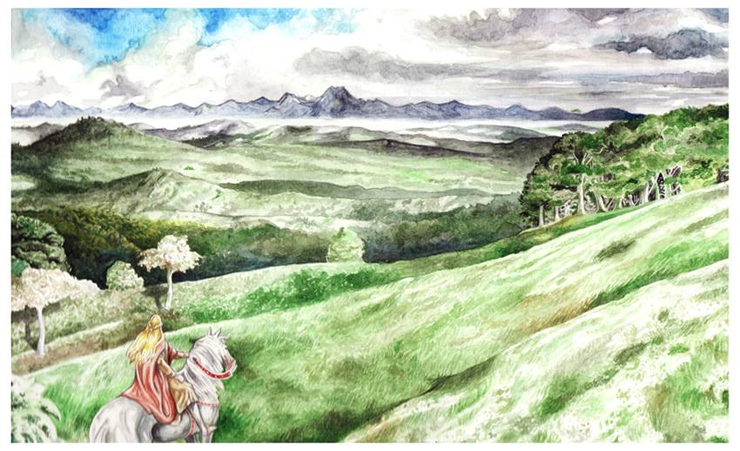
One night he spies campfires and hears some very unfamiliar voices singing. Keeping to the trees, Finrod goes in close to observe, afraid they might be Orcs that somehow slipped through the leaguer up north. But nope, it’s not Orcs. It’s…us!
Men! They’re the first batch of the Secondborn Children of Ilúvatar to cross the Blue Mountains, the first to come this far west…as ever their feet have pointed them since waking at the first rising of the Sun. Lots of firsts in this chapter. Which means one of these mortals is bound to be the first Man to sneeze in Beleriand, another the first to blow a kiss in Beleriand, and still another the first mortal Man to step on a rake in Beleriand.
Now Men have already been around for roughly three hundred years, so that’s…what, maybe ten generations? Enough time to work up some solid culture, customs, and languages. And all this time they’ve been far off to the east in Middle-earth encountering only Moriquendi (Dark Elves), Dwarves, and plenty of Morgoth’s beasties. The Moriquendi have helped mentor them thus far, even helped them form their language—since, well, Elves are “those who speak with voices.” Light Elf or Dark Elf, they all love to talk.
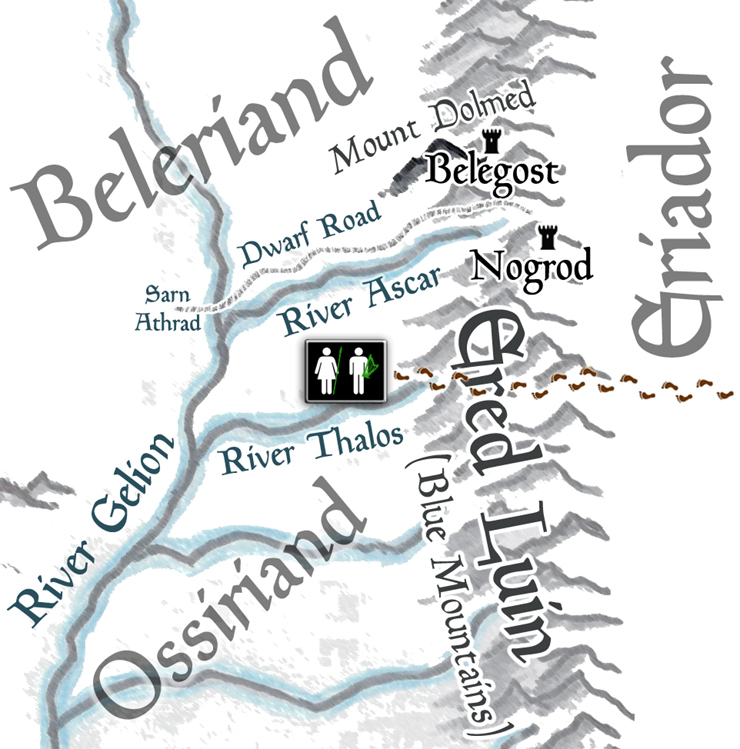
Watching them from the trees, Finrod feels love for these Men. At a glance they should look a lot like Elves, if not quite as comely and certainly a great deal hairier. But he knows these must be the Atani, the Second People, that he heard of back in Valinor. In which case they’re here on Middle-earth by Ilúvatar’s will. So there’s no question, to the likes of Finrod: they must be welcomed! Would they be his, could they be his? ♪ Won’t they be his neighbor? ♫
Finrod goes in among them while they’re sleeping. Either he sneaks past them, or else they simply have no sentries keeping watch. Well, why wouldn’t they, right? But tragically, they believe they’ve left all perils behind them and have come at last to a “land without fear.” That’s why they’d been singing in the first place, which is how Finrod heard them. Now inside their camp, the King of Nargothrond takes up a junky old “rude” harp that their chieftain had “laid aside.” Even though we know Finrod is humble and only wants to greet them with his own art, he’s about to rock their world with his talent.
…and he played music upon it such as the ears of Men had not heard; for they had as yet no teachers in the art, save only the Dark Elves in the wild lands.
As they come to, it’s like a waking dream to them. Probably in Quenya (shhh, don’t tell Thingol!), Finrod sings of Valinor, of Aman, and of the making of Arda itself—such as he might have heard from the mouths of the Valar themselves. The Men listen in silence, a captive audience. They’re totally enraptured by this hypnotic Elf king with an otherworldly light in his Calaquendi eyes, something they’ve never beheld before. No, they can’t understand a lick of what he’s actually saying, yet his music is evocative and conveys the imagery with its very sound.
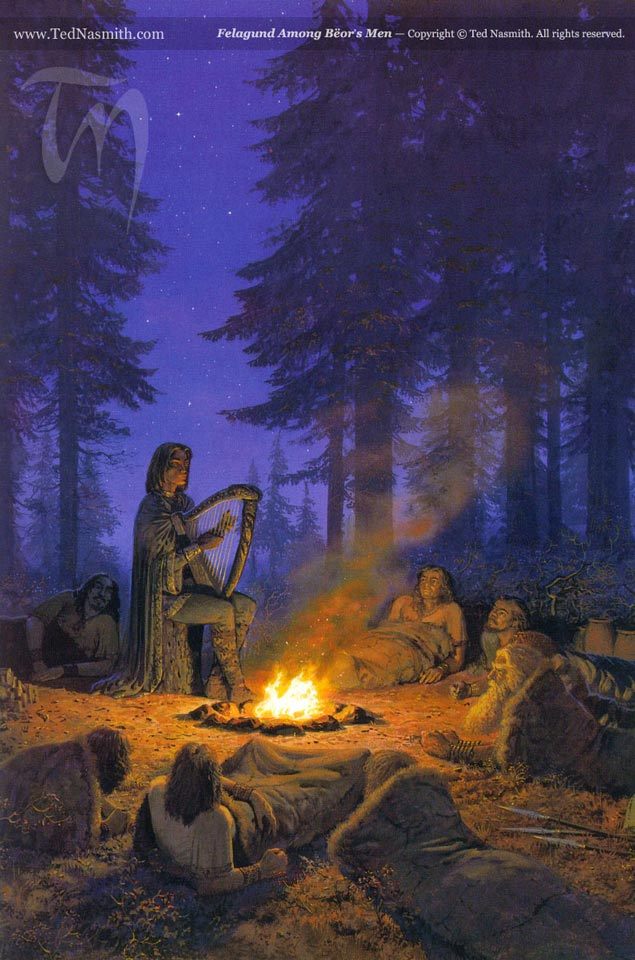
This is a pivotal encounter in Middle-earth, certainly for the next couple of centuries but also the far-flung future. This is the moment of first contact between the High Elves and the Secondborn. Again, yes, Men have met Elves before, but not of this sort, and none who are so…purposeful and organized, or who have learned at the feet of the gods themselves. The Noldor, while at times impetuous and bossy, are also the ones ordering the defense of Beleriand and keeping Morgoth contained.
And it is very likely Morgoth himself who has inadvertently driven Men here, if we are to believe what was “said afterwards among the Eldar.” That is, that the Dark Enemy of the World has already paid them a visit in the time after their awakening. Not to capture them (yet) and turn them into Orcs (yet?) as he did with some early Elves, but rather to place the “shadow of evil” upon them. How he accomplished this no one knows, yet it’s something that weighs on them like the Kinslaying does upon the Noldor. Elsewhere it’s said that he helped inspire the fear of death within them, when death was meant to be the “gift of Ilúvatar.”
Admittedly, as a reader, it’s rather mystifying: Morgoth couldn’t have assumed a deceptive and fair shape as he had in Valinor after his imprisonment. He’s been locked in his Dark Lord persona since his Tree-spearing date with Ungoliant. So either he sent some of his nebulous shadows or “evil spirits” among Men or else he straight-up appeared before some of them in his dreadful persona. Who knows? (The shadows know.)
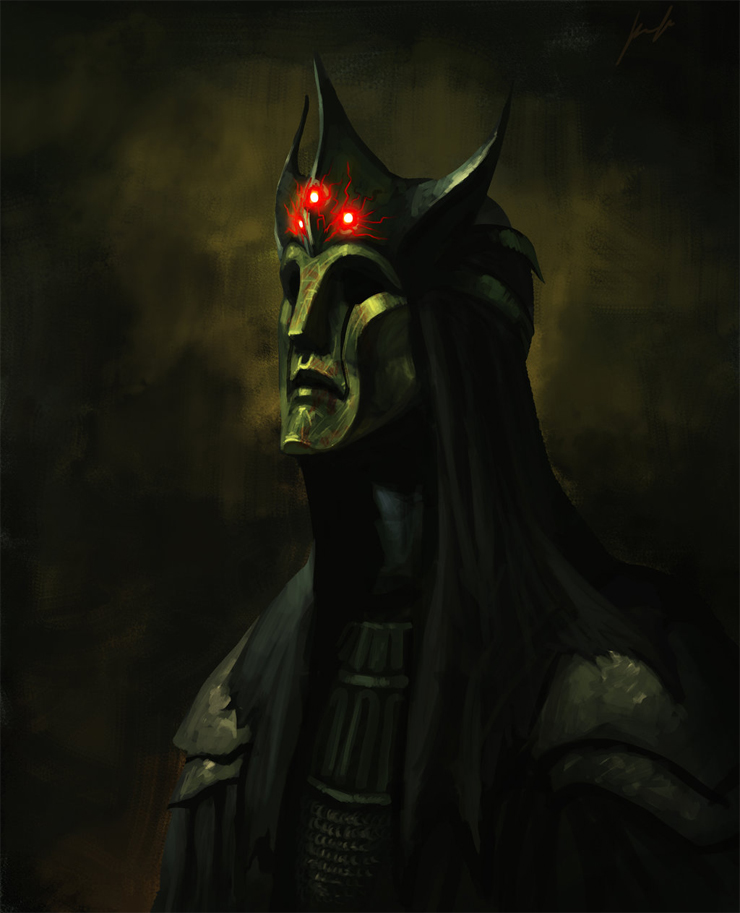
But however he did this, it’s not surprising. Anything seemly and interesting that shows up on Middle-earth that Morgoth didn’t make himself (which is basically all of it) is something he wants to mess up. Messing stuff up is his speciality, and it’s also the best attempt he can make at spiting Ilúvatar. And so when the Secondborn first cropped up, he wanted them to be a problem, not a partner, to the Firstborn. Man and Elf teaming is bad news for Angband. As it happens, Morgoth effects enough corruption among Men that he’s going to make enemies of some and pawns of others.
This chapter deals mostly with the former. As it is, Morgoth’s minions have already troubled Men out in the east and have given them something to run from. That’s why these people have trekked this far in the first place. Ever westward have they wandered, following the rumor of the Valar—of fair beings of great light and power. And it’s the manner by which Men are received in Beleriand that makes all the difference. Finrod being the one to make that good first impression is clearly the best case scenario, and one that will resonate forever—and still there’ll be some Men who make trouble, who are swayed by the machinations of Morgoth, or even side with him in time. So can you imagine if it had been someone like Eöl who found Men first? Or one of the jerk sons of Fëanor? Or even those bowstring-happy Green-elves? Talk about starting off on the wrong foot.
As it happens, though, Finrod just wants to make friends, and to teach these young Men “true knowledge.” I know that sounds pompous and high-minded but it’s a simple fact that the Eldar have quite a head start on the ways of Arda. The Calaquendi have themselves studied with those who helped fashion the world itself. And since the Noldor are specifically savvy with languages, it doesn’t take Finrod long to master the speech of Men and talk freely with them.
Now of all these folk, it’s their chieftain, Beör the Old, who really takes to Finrod. Beör (BAY-or) explains that his people are only the first to come over the mountains, that there are two other groups of Men waiting just over yonder. So that’s three groups in total…which may call to mind the great marches of the Eldar long ago, when three separate kindreds were traveling more or less together westward, except they’d be following Oromë the Vala. Men have come less informed.
‘A darkness lies behind us,’ Beör said; ‘and we have turned our backs upon it, and we do not desire to return thither even in thought. Westwards our hearts have been turned, and we believe that there we shall find Light.’
We can assume that Finrod doesn’t wait too long to break it to them: Morgoth is the big baddy behind that darkness, and he actually lives over in this corner of Middle-earth. It’s like if hobbits had fled the Shire, driven out by servants of Sauron, only to migrate to a suburb of Mordor. Maybe it’s better than that, because the Noldor seem to have Morgoth in check. They’ve got their leaguer going on and it’s been holding strong for over two hundred years. Beör and his folk take all this in stride; they’re hardy men and women with a good attitude. And in the company of one as winsome and wise as Finrod Felagund, they’re bound to be just fine here. Surely all the Elves of Beleriand are just as gracious as him!
Right. About that…
With Beör’s people hanging out in Ossiriand, it’s inevitable that the Green-elves were going to fuss about it. Kingless and cautious, there’s no way they’d miss these lumbering Men who don’t—by their standards—respect the land. And to be fair, the Green-elves are insular Moriquendi far removed from the company of the Valar; they’d never heard the Valar speak of the coming of the Secondborn. They’re more resistant to change. I daresay there’s a good chance they might have tried to solve their Man problem with arrows had Finrod, their friend, not already found them first. So they send messengers to him.
‘Lord,’ they said, ‘if you have power over these newcomers, bid them return by the ways that they came, or else to go forward. For we desire no strangers in this land to break the peace in which we live. And these folk are hewers of trees and hunters of beasts; therefore we are their unfriends, and if they will not depart, we shall afflict them in all ways that we can.’
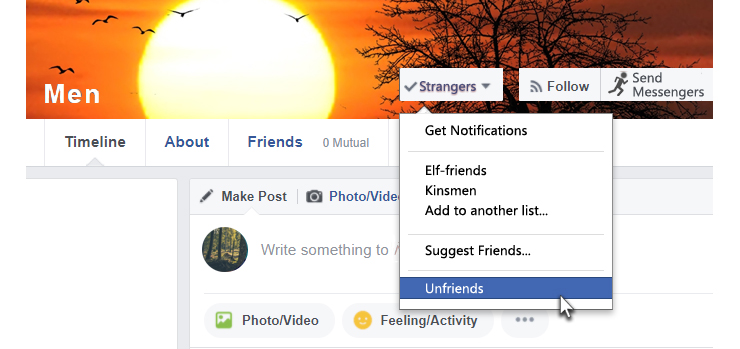
Finrod gets it; these Men can’t stay here. The Green-elves are cagey. So he encourages Beör to bring his people up to the green plains east of Doriath and just south of Nan Elmoth (where Eöl lives, this being long before Aredhel comes to his forest). As this becomes a sort of gathering place for Men, this region gets the name Estolad, meaning the Encampment.
And about a year later, those other two groups Beör was talking about start to come over the Blue Mountains, and soon Estolad becomes the springboard from which each group will eventually head off to find more permanent lodgings. But while they’re still here, the rest of the Eldar of Beleriand, quite unlike those unfriending Green-elves, are excited to hear about the coming of Men. Plenty of Noldor and Sindar alike set out on holiday from all over just to meet and/or gawk at them. They’ve heard so much about them! (Okay, not that much. Kinda sorta.)
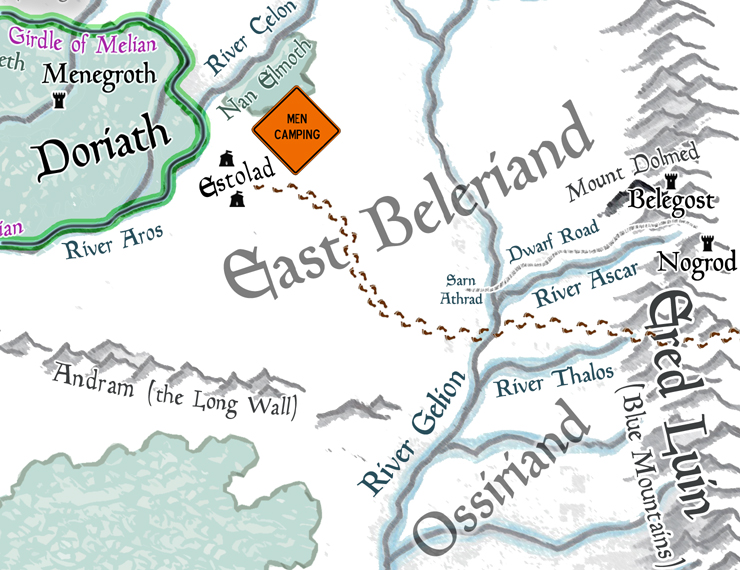
Altogether, the three big groups of Men—each led by its own large house—are called the Edain (AY-dine). The name will come to refer to those of the Firstborn who are allied, in varying degrees, with the Eldar against Morgoth. Then there’s the label Elf-friends, which in these days is largely synonymous with Edain, though there will be some individual dissenters among them who aren’t big fans of the Elves. In later days Elf-friend is more of an epithet for any non-Elf who is especially favored by Elves—like Bilbo and Frodo Baggins.
The heads of the three royal Noldor houses each beckon to the Edain. Fingolfin, as High King, sends messengers to make their welcome more formal. Maedhros, as head of the house of Fëanor, is inviting as well. And of course Finrod is already happy to have Men in the neighborhood. So when the Edain are given the green light, they start off in groups large and small and settle in various Noldor-occupied lands. The Elves are not strictly their landlords or rulers, but these Men become as vassals or apprentices to them, learning all that they can.
So who are they all?
- The first group are the Men of the House of Beör. They mostly settle in a corner of Dorthonion called Ladros, way up to the north, practically looking down on the plains of Ard-galen (Angband’s front lawn). And because of their first meeting with Finrod, their loyalties will fall to the Noldorin house of Finarfin, of which Finrod is the head. Beör himself, by this point, has long left his kinsmen to go live in Nargothrond. Rulership of his house is passed down, and it’s his great-grandson Boromir who will be named the lord of Ladros. Yep, you heard that name right. He called it first.
- Then come the Haladin, who for a long while take no chief and don’t even come to Estolad right away. They’re a stubborn, independent folk whose language was long “sundered” from those of Beör’s, so culturally they’re quite aloof. Soon enough they’ll be identified as the House of Haleth, named for a particularly valiant woman (see below).
- The third and largest group are the Men of the House of Hador, and they are closer in kindred and friendship to Beör’s people. They largely settle in the Dor-lómin part of Hithlum. They’re a tall and warlike bunch, and their loyalties will lie with the house of Fingolfin. Hador himself the Elves call Lórindol, or Goldenhead, because this is largely a family of Nordic-style blondes and because Elves like to harp on physical appearance (as they did with the Naugrim).
Of course, Elves also just like to harp.
But you know who doesn’t care one bit for the coming of these mortals into the West? Not one tiny bit? King Thingol, of course. Now that he’s finally gotten used to the return of the Noldor, here come Men tracking mud into Beleriand, from Eru knows where! Right away he announces that “no Man” can come into Doriath, and that if they want to settle anywhere it had better be up in the lands north of his realm, not south—where he’d once tried to get the Noldor to stay, possibly because more bodies between Doriath and Angband is ideal? But damn it, Beleriand is getting crowded!
Yet Melian, his wise Maia queen, seems to know her husband well enough to not bother gainsaying him in public. He’s not going to listen anyway. But to her pal and confidante, Galadriel, she tells it straight:
Now the world runs on swiftly to great tidings. And one of Men, even of Beör’s house, shall indeed come, and the Girdle of Melian shall not restrain him, for doom greater than my power shall send him; and the songs that shall spring from that coming shall endure when all Middle-earth is changed.
Melian knows stuff. Now, to be fair to Thingol, who is most of the time a good if grouchy leader, he’s no Maia. He’s just an Elf-king. And sure, he’s from one of the earliest generation of Elves, who resided by the shores of Lake Cuiviénen, not just some numbskull who thinks he knows things about things he knows nothing about. But Melian, who was there in the Timeless Halls and sang in the Music of the Ainur, who looked upon Ilúvatar’s vision of Eä, is going to know more. She clearly recognizes some part of what was foretold. Something about the House of Beör is familiar enough to her that she knows some heavy exposition’s about to drop. It’s interesting that she tells this only to Galadriel and not to her own daughter, Lúthien. Perhaps—and I’m just spitballing here—because she knows there’s a difference between knowing the path and walking the path.
Meanwhile, back in Camp Estolad, there is dissension among the gathering Men. Not everyone’s on board with sucking up to the Eldar (as they might see it). Some of the arguments that arise are…reasonable. Men know much less about what’s going on over here; it’s an awful lot of hearsay coming their way. After all their marching west, not only is there no going further beyond the sea, where Light with a capital “L” is supposed to be for their salvation, but now the Dark Lord is here in Beleriand? It sure sounds like an Eldar problem, not a Mannish problem. The Elves are wise, sure, but also dangerous themselves. This is no place for Men.
By the way, with this flurry of Man-names, it helps to have a chart handy. There’s more Man than Elf names to take in this time because there’s a…shall we say…a higher turnover rate with mortals as the First Age progresses. And also, Tolkien drops more of his spoiler-snippets even as he names them.
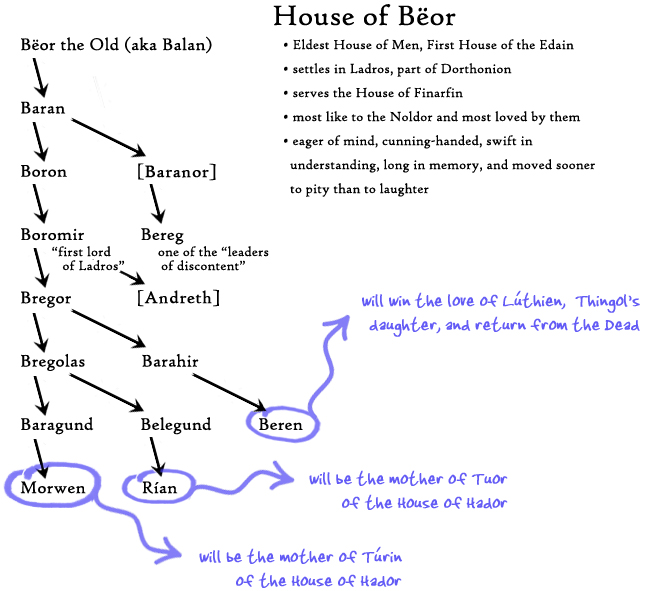
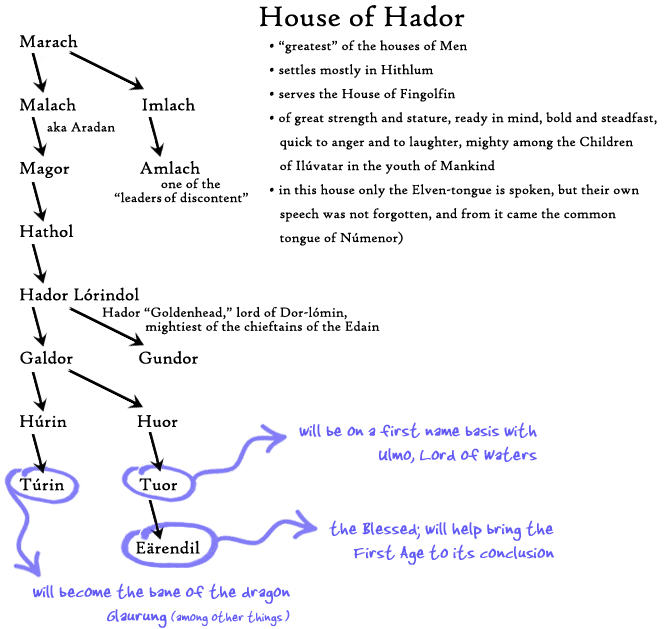
Two particular dudes are called out as “leaders of discontent”: Bereg of the House of Beör and Amlach of the House of Hador. At a great assembly of Men, the Elf-friends (those Edain who are sympathetic to the Eldar) propose that maybe coming here to Beleriand, while certainly a perilous place, was what Men were supposed to do. To come make the Eldar stronger, to help fight the good fight. But Bereg’s all, no way, Man, let the ancient Elves deal with it. We don’t live long enough for this crap.
Then it gets creepy. For “one who seemed to all to be Amlach” chimes in with some really sardonic words, casting the Elves in a more suspicious light. He points out that all these stories about Morgoth are “tales to beguile newcomers that are unwary.” I mean, is this so-called Dark Lord even real? Has anyone actually seen the guy? No? Not once? How convenient. More likely he’s just a bogeyman to frighten Men so they can take over, those greedy immortal bastards. That’s right, the Eldar are the real problem.
So “Amlach” concludes with:
Let the Orcs have the realm that is theirs, and we will have ours. There is room in the world, if the Eldar will let us be!
These dire words hold sway and a whole bunch of Men agree: it’s time to get the hell out of this land. They get packing. But at some point Amlach walks in—again?—and finds out about the speech he allegedly made. He denies it. I mean sure, he’s all for leaving the Eldar to their own problems, but that totally wasn’t him last night! Someone was wearing his face and using his voice?! WTF! And yikes, what else did “Amlach” do? Some freaky-ass skulduggery, is what this is.
Of course, to the Elf-friends, this is just confirmation: Yes, Virginia, there is a Dark Lord! The Eldar are not making stuff up. See, he’s already sent spies and imposters, “for he fears us, and the strength that we may give to his foes.”
Well, it’s all very polarizing. To some, the idea of lurking spies only strengthens their resolve to join with the Eldar. To others, it’s all the more reason to get away from this devilish region of Middle-earth. Amlach himself, angry at having been impersonated by…some thing, actually “repents” of his earlier dissent and goes on to join up with Maedhros. Still, plenty do depart from Estolad and head back over the mountains, leaving the Elves to their own foes and devices. For now.
Meanwhile, back in Angband, Morgoth hears that all these west-coming Men aren’t the rubes he’d been counting on. So he changes gears. If trickery isn’t going to accomplish their removal, perhaps a bit of the old ultraviolence will. He sends out an Orc-raid to do some hurting, one large enough to be formidable but small enough to sneak through the leaguer. The Orcs venture east and south, striking at the Haladin, that second group of independent Men who, upon coming over the Blue Mountains, settled not in Estolad but within the lands ruled by Caranthir. They’re the outliers among Men, the stragglers, and make for choice prey.
Remember Caranthir? He’s that trash-talking fourth son of Fëanor who set up trade ventures with the dwarves in the northeastern corner of Beleriand. And when the Haladin came to hang out in his land, he didn’t bother with them at all, giving them neither welcome nor harassment. But because the Haladin are less unified than the other groups of Men, they’re easier pickings for the Orcs. At least at first. One especially dauntless man named Haldad rallies the bravest among them into a defensible stockade. Behind it they usher as many women and children as they can, guarding them even as the Orc raiders lay siege. And in that siege both Haldad and his son, Haldar, are cut down. Worse, Haldar is slain just trying to keep his dad’s body from getting hacked up by the Orcs.
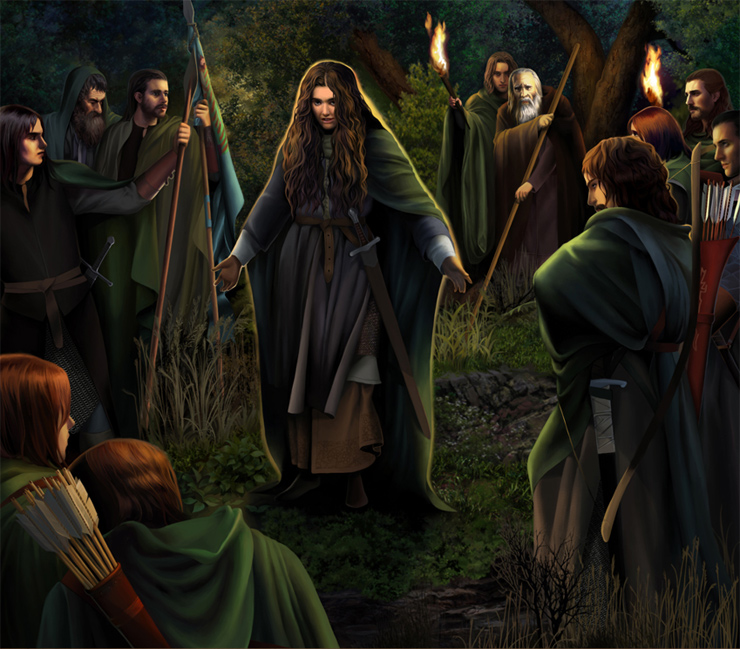
So it is Haldad’s other kid—a daughter, Haleth (HALL-eth)—who takes charge of the defense of the stockade and all who remain. She is valiant, “a woman of great heart and strength,” and though despair at their losses threatens to overtake the Haladin, Haleth holds them together against the Orcs. She was fighting alongside her brother all along, but served no role in leadership while her father lived. And Haleth is no joke. Women, as we all know, tend not to lead battles in Tolkien’s world, but when their men fall or balk, they step up every time and hold the line. Which makes Haleth, who embodies the fierce independence of the Haladin as a whole, one of the most believable and most relatable characters in the legendarium. At least I think so.
For seven days she keeps her people going. Now eventually the Orcs do break through the stockade, and in that eleventh hour, Caranthir and a posse of Elves come riding in to finish them off, driving “the Orcs into the rivers.”
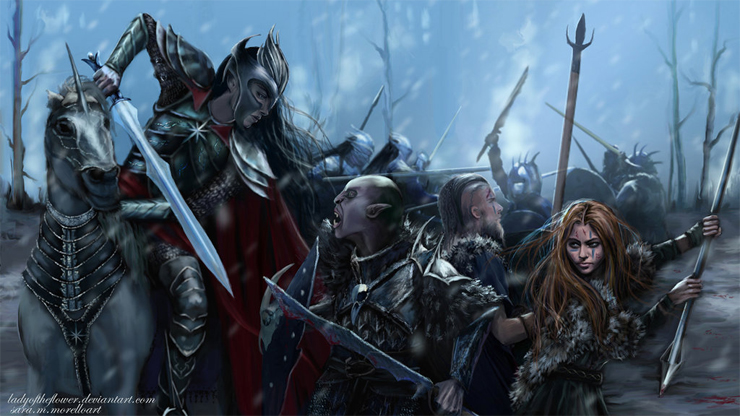
But Caranthir is super impressed with Haleth’s prowess. Right away he offers her people a place under his banner and lands of their own within his.
But Haleth’s all thanks-but-no-thanks, for she is “unwilling to be guided or ruled” like the rest of her folk. She becomes their chieftain, gathers them up, then seeks out as many of the still-living Haladin “who had fled wild into the woods before the Orcs.” Haleth then takes them all and goes to Estolad at last. But even there among the other houses of Men they’re not going to stay too long.
By this point they’re now called the People of Haleth. Westward the Haladrin venture on, lacking any Beleriand travel guides and without the help from any Eldar. Don’t tell the Haladin what they can or cannot do, buster! Right away they find Doriath impassable, so Haleth leads them north—even against the wishes of most of her people—through Nan Dungortheb. The goddamned Valley of Dreadful Death again. You know, where Aredhel went astray in the previous chapter (no…will go astray some years from now in the timeline). But being unprepared for a land so thick with ancient evils, what with the legacy of Ungoliant still at work, it is no surprise that Haleth and the Haladrim suffer both hardship and loss along the way. But when they finally cross the River Sirion and begin to filter into West Beleriand, they begin settling again. Starting new lives for themselves.
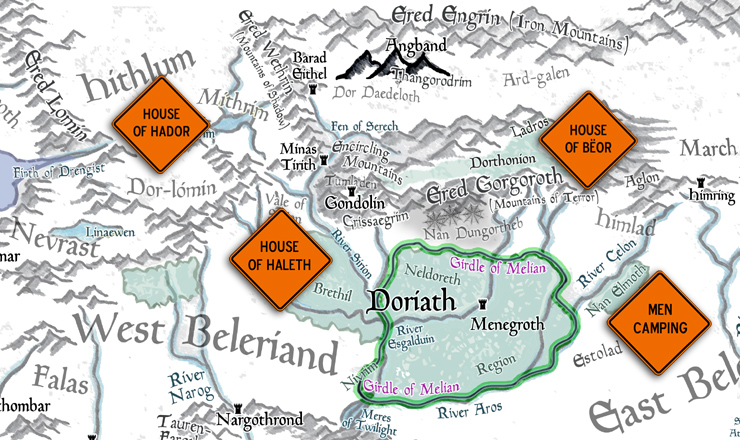
Being Haladin, they don’t all stay together. Many go off on their own, scattering far even into Nargothrond, while the rest stay with Haleth, happy to let her call the shots. She takes them into the forest of Brethil, that part of Doriath that lies outside the Girdle of Melian. Now, only at the expressed request of Finrod Felagund does cranky old King Thingol allow them to dwell there at all. Because Finrod’s just the best: when he heard of the trials of Haleth and her people, he couldn’t not speak up for them. They’ve been through a lot—why can’t they be Thingol’s neighbors?
Thingol is still obstinate about it, though. He declares that the Haladin can dwell freely in Brethil if they guard that corner of his realm, allowing no Orcs to pass. To which Haleth likely rolls her eyes. She says, presumably to his messengers:
Where are Haldad my father, and Haldar my brother? If the King of Doriath fears a friendship between Haleth and those who have devoured her kin, then the thoughts of the Eldar are strange to Men.
Which is about as diplomatic as I think she can be, or should have to be. Though I would love to know what she says about Thingol behind closed hut doors!
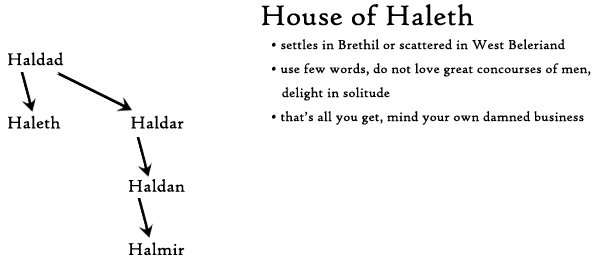
Haleth goes down in history as a woman who sticks it to The Man, be he Elf or Morgoth, in small and large ways. She’s not a perfect leader, but still a good one, the sort whose policies you won’t always like but she’ll keep most of you alive if you follow her. She’s not an ethereal Galadriel-esque woman, just a more familiar, down-to-earth one. Yet she is Lady Haleth among the Haladin, beloved by her, and she lives out her life in Brethil. She never marries, but she does have a nephew, and her line continues. In one variation of from Unfinished Tales, Haleth’s even described as keeping a “picked bodyguard of women.”
Count me among those readers who wish Haleth had her own chapter here, as others will. But then again, she’s not the sort of heroine who would go on an epic solo quest. She is where her people are, fighting to the last on their behalf. And when she eventually dies, they honor her with a burial mound which is named Tûr Haretha, the Lady-barrow.
Oh yes, mortals are into burial mounds. Y’know, like those found in the Barrow-downs in The Fellowship of the Ring. Which brings us to the final topic of death….
It’s in these early years, when the Edain are settling in Elven lands, that the Eldar finally witness with their own eyes what death means among Men. Sure, they’ve seen Men slain, just as Elves have been slain by Orcs and other servants of Morgoth. But Finrod, who brought Beör to come to live in his court, eventually witnesses his friend relinquish his life willingly and in peace at the ripe young age of 93. It’s heartbreaking to Finrod—Beör only just got here (44 years ago)! That’s no time at all for an Elf, but half a lifetime to Beör. And yet this was death by “no wound or grief, but stricken by age.”
Men may be called the Sickly by the Elves (among other things!), but they also see that Men are released from all burdens. It is “the death of weariness” which the Firstborn Children of Ilúvatar can scarcely understand. Elves are here in Arda for the long haul; they can and will grow weary as the centuries roll past. Even if they are killed—and hoo-boy, many will be—their spirits will go to the Halls of Mandos and eventually be re-embodied in Valinor…which is still on Arda, and still bearing the memory and weight of the world. But to the spirits of Men, Mandos is just a way station, at best, before they depart to a mysterious elsewhere, by Ilúvatar’s design.
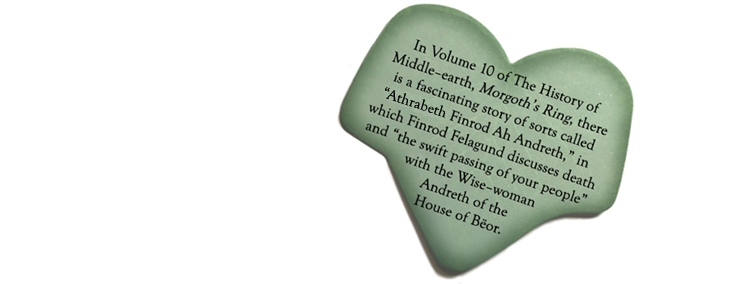
Still, this is a grief to the Eldar, for so quickly they must lose their friends. But at least, while they’re around in Beleriand, the Edain will at least live a bit longer. The mere association with their immortal buddies seems to give Men a few years to live. And so during this time, these Edain—these future Númenoreans, these future Dúnedain!—learn much from the Eldar.
…all such art and knowledge as they could receive, and their sons increased in wisdom and skill, until they far surpassed all others of Mankind, who dwelt still east of the mountains and had not seen the Eldar, nor looked upon the faces that had beheld the Light of Valinor.
Elsewhere, Morgoth will use Men as pawns and battle fodder. But here in Beleriand, he’s mostly just made enemies. Thus in Appendix A of The Lord of the Rings, it is said:
The Edain (Atani) were three peoples of Men who, coming first to the West of Middle-earth and the shores of the Great Sea, became allies of the Eldar against the Enemy.
And from those three peoples, mortal heroes are soon to arise and take future chapters of their own. As Elrond mentioned, Túrin, Beren, and Tuor are just a few of the legends who’ll be counted beside Frodo Baggins someday.
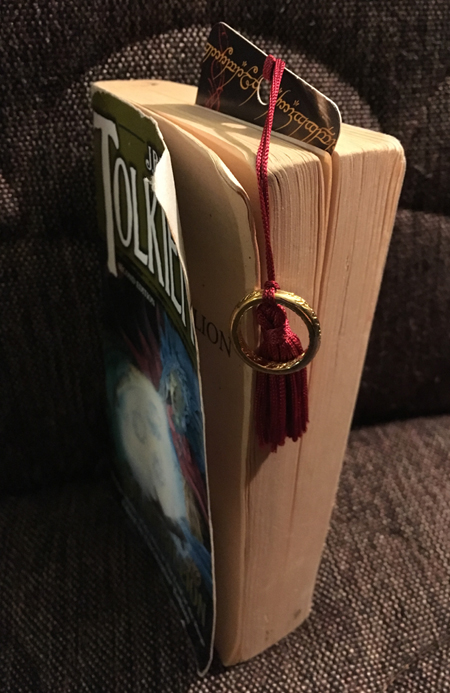
In the next installment, we’ll finally face “Of the Ruin of Beleriand and the Fall of Fingolfin,” where Morgoth’s shit is going to hit multiple fans, and the long peace established by the Noldor’s leaguer will come to an end. But who knows? Maybe it’ll just lead to a reasonable truce which lasts for a thousand years. Maybe?
Top image from “The Rescue of the Haladin” by Sara M. Morello
Jeff LaSala is a mortal Man but doesn’t usually capitalize that word. It sure feels weird to do that in the real world. Tolkien nerdom aside, Jeff wrote a Scribe Award–nominated D&D novel, produced some cyberpunk stories, and now works for Tor Books.










